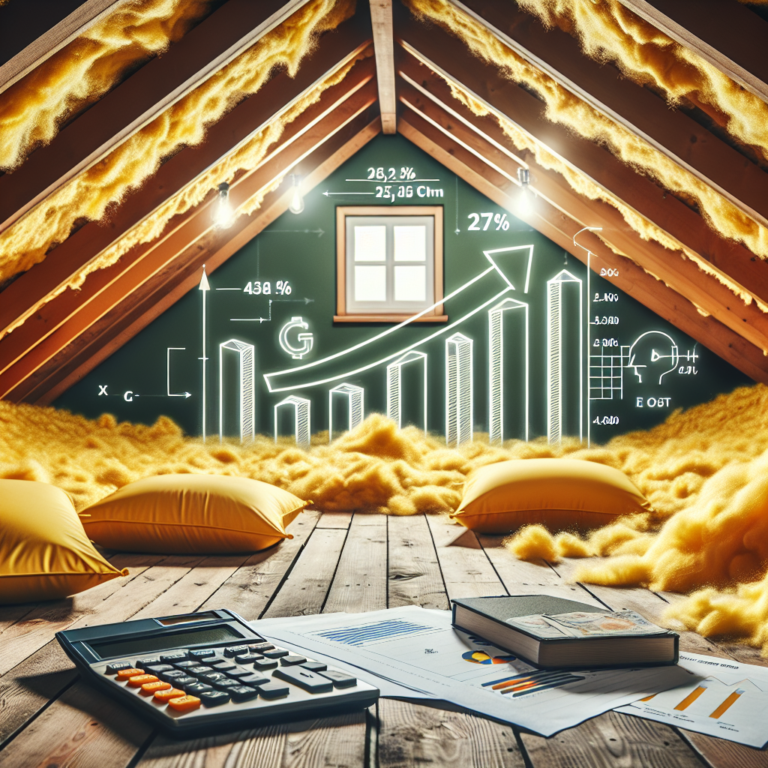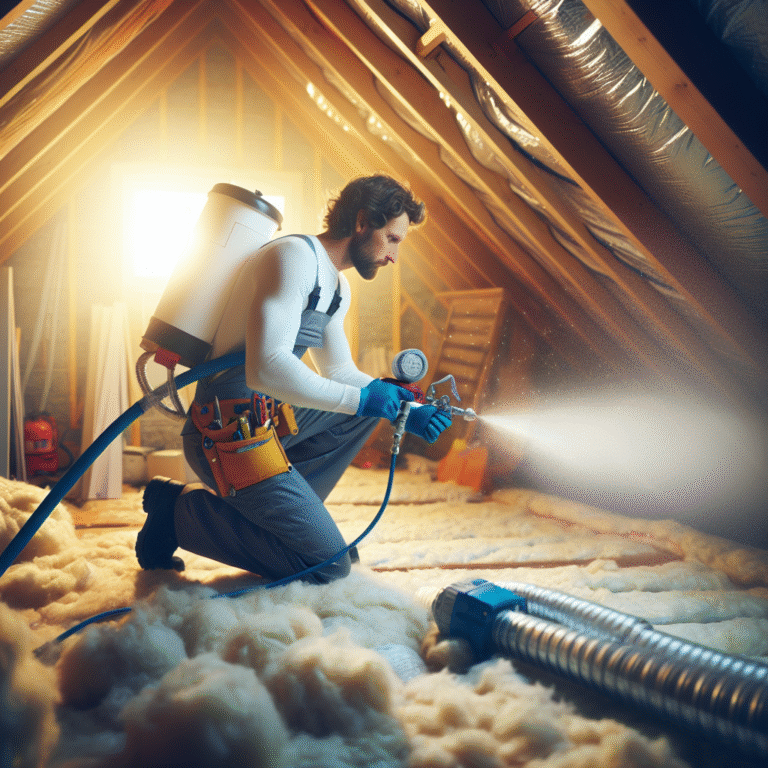-
Table of Contents
“Efficient insulation, cooler home, and happier HVAC system.”
“Reduce the strain on your HVAC system and save on energy costs by properly insulating your home. Visit texasinsulationsolution.com to learn more and schedule an insulation consultation today.”
Introduction
Proper insulation is a crucial aspect of maintaining a comfortable and energy-efficient home. It plays a significant role in reducing the workload on HVAC (heating, ventilation, and air conditioning) systems. In this introduction, we will discuss how proper insulation can help reduce HVAC system overload and its benefits for homeowners.
The Importance of Proper Insulation for Reducing HVAC System Overload
Proper insulation is a crucial aspect of maintaining a comfortable and energy-efficient home. It not only helps to regulate the temperature inside the house but also plays a significant role in reducing the workload on your HVAC (Heating, Ventilation, and Air Conditioning) system. In this article, we will discuss the importance of proper insulation in reducing HVAC system overload and how it can benefit both your home and your wallet.
First and foremost, let’s understand what HVAC system overload means. It refers to the excessive strain put on your HVAC system to maintain a comfortable temperature inside your home. This can happen due to various reasons, such as inadequate insulation, air leaks, or outdated equipment. When your HVAC system is overloaded, it has to work harder and longer to keep your home at the desired temperature, resulting in increased energy consumption and higher utility bills.
One of the main reasons for HVAC system overload is poor insulation. Insulation acts as a barrier between the inside and outside of your home, preventing the transfer of heat. Inadequate insulation or gaps in insulation can lead to heat loss during winters and heat gain during summers, making your HVAC system work harder to compensate for the temperature difference. This not only puts a strain on your system but also leads to higher energy bills.
Proper insulation helps to maintain a consistent temperature inside your home, reducing the workload on your HVAC system. It keeps the warm air inside during winters and prevents the hot air from entering during summers, thus reducing the need for your HVAC system to constantly run. This not only reduces the strain on your system but also helps to lower your energy bills.
Moreover, proper insulation also helps to improve the overall efficiency of your HVAC system. When your system is not overloaded, it can operate at its optimal level, using less energy to maintain the desired temperature. This not only saves you money but also reduces the wear and tear on your system, extending its lifespan.
Another benefit of proper insulation is that it helps to maintain a comfortable and consistent temperature throughout your home. Inadequate insulation can result in temperature variations in different areas of your home, making some rooms too hot or too cold. This can lead to discomfort and the need to constantly adjust your thermostat, putting a strain on your HVAC system. With proper insulation, your home will have a more even temperature, reducing the workload on your system and ensuring your comfort.
In addition to reducing HVAC system overload, proper insulation also has a positive impact on the environment. When your HVAC system is not overloaded, it consumes less energy, resulting in lower carbon emissions. This helps to reduce your carbon footprint and contribute to a greener and more sustainable environment.
In conclusion, proper insulation is crucial for reducing HVAC system overload. It helps to maintain a consistent temperature, improve the efficiency of your system, and reduce your energy bills. By investing in proper insulation, you not only save money in the long run but also contribute to a more sustainable future. So, make sure to check your home’s insulation and address any issues to ensure a comfortable and energy-efficient living space.
Professional Removal of Old or Unsafe Insulation for Optimal HVAC Performance
Proper insulation is crucial for maintaining a comfortable and energy-efficient home. It helps regulate the temperature inside, keeping it warm in the winter and cool in the summer. However, many homeowners overlook the importance of insulation and its impact on their HVAC system. Improper or inadequate insulation can lead to an overload on the HVAC system, resulting in higher energy bills and potential damage to the system. In this article, we will discuss how proper insulation can reduce HVAC system overload and the importance of professional removal of old or unsafe insulation for optimal HVAC performance.
Insulation acts as a barrier between the inside and outside of a home, preventing heat transfer. In the winter, it keeps the warm air inside, and in the summer, it keeps the cool air in. This means that the HVAC system does not have to work as hard to maintain a comfortable temperature, resulting in lower energy consumption. However, if the insulation is not installed correctly or is inadequate, it can lead to an overload on the HVAC system.
One of the main reasons for HVAC system overload is air leaks. Improperly installed insulation can leave gaps and cracks, allowing air to escape. This means that the HVAC system has to work harder to compensate for the lost air, resulting in increased energy consumption. Additionally, air leaks can also allow outside air to enter the home, making it harder for the HVAC system to maintain a consistent temperature. This can lead to uneven heating or cooling, causing discomfort for the occupants.
Another factor that can contribute to HVAC system overload is inadequate insulation. If the insulation is not thick enough or has a low R-value (a measure of insulation’s ability to resist heat flow), it will not be able to effectively regulate the temperature inside the home. This means that the HVAC system will have to work harder to compensate for the lack of insulation, resulting in increased energy consumption and potential damage to the system.
Moreover, old or unsafe insulation can also lead to HVAC system overload. As insulation ages, it can become compressed or settle, reducing its effectiveness. This means that the HVAC system will have to work harder to maintain a comfortable temperature, resulting in increased energy consumption. Additionally, old insulation can also become a breeding ground for mold and mildew, which can affect the air quality in the home and potentially damage the HVAC system.
To avoid HVAC system overload, it is essential to have proper insulation installed in your home. This includes ensuring that the insulation is installed correctly, has the appropriate thickness and R-value, and is free of any air leaks. However, if you have old or unsafe insulation in your home, it is crucial to have it professionally removed.
Professional insulation removal is necessary for several reasons. Firstly, it ensures that the old insulation is safely and properly removed without causing any damage to the home or the HVAC system. Secondly, it allows for a thorough inspection of the home’s insulation needs, ensuring that the new insulation is installed correctly and effectively. Lastly, professional insulation removal also includes air sealing, which helps prevent air leaks and further reduces the risk of HVAC system overload.
In conclusion, proper insulation is crucial for reducing HVAC system overload and maintaining optimal HVAC performance. It is essential to have professional removal of old or unsafe insulation to ensure that your home is adequately insulated and to avoid potential damage to your HVAC system. By investing in proper insulation and professional removal, you can not only save on energy bills but also improve the comfort and air quality in your home.
How Safe Insulation Can Help Prevent Overload and Extend the Lifespan of Your HVAC System
Proper insulation is a crucial aspect of maintaining a safe and efficient home. Not only does it help regulate the temperature inside, but it also plays a significant role in reducing the workload of your HVAC system. In this article, we will discuss how proper insulation can prevent overload and extend the lifespan of your HVAC system.
First and foremost, let’s understand what HVAC overload means. HVAC stands for heating, ventilation, and air conditioning, and it refers to the system responsible for regulating the temperature and air quality in your home. When the HVAC system is overloaded, it means that it is working harder than it should be, which can lead to various issues.
One of the main causes of HVAC overload is inadequate insulation. Insulation acts as a barrier between the inside and outside of your home, preventing heat from escaping during the winter and entering during the summer. When there is not enough insulation, the HVAC system has to work harder to maintain the desired temperature, leading to overload.
Moreover, inadequate insulation can also result in air leaks, which can further strain the HVAC system. These leaks can occur around windows, doors, and even through the walls and roof. As a result, the HVAC system has to work harder to compensate for the lost air, leading to increased energy consumption and higher utility bills.
On the other hand, proper insulation can significantly reduce the workload of your HVAC system. By creating a well-insulated envelope around your home, the HVAC system can operate more efficiently, without having to work overtime to maintain the desired temperature. This not only reduces the risk of overload but also helps in extending the lifespan of your HVAC system.
Another way proper insulation can prevent HVAC overload is by reducing the need for constant temperature adjustments. When there is inadequate insulation, the temperature inside your home can fluctuate significantly, especially during extreme weather conditions. This can cause the HVAC system to constantly turn on and off, leading to overload. With proper insulation, the temperature inside your home remains stable, reducing the strain on the HVAC system.
Furthermore, proper insulation can also help prevent moisture buildup, which can lead to mold and mildew growth. When moisture seeps into your home, it can cause damage to the walls, ceilings, and floors, and also create the perfect environment for mold and mildew to thrive. These issues not only affect the structural integrity of your home but can also impact the efficiency of your HVAC system. Mold and mildew can clog the air ducts, making it harder for the HVAC system to circulate air, resulting in overload.
In addition to preventing overload, proper insulation can also help in extending the lifespan of your HVAC system. When the system is constantly overloaded, it can lead to wear and tear, causing it to break down more frequently. This not only results in costly repairs but also shortens the lifespan of the system. By reducing the workload of the HVAC system, proper insulation can help it operate more efficiently, leading to fewer breakdowns and a longer lifespan.
In conclusion, proper insulation is essential for maintaining a safe and efficient home. It not only helps regulate the temperature inside but also plays a crucial role in preventing HVAC overload. By creating a well-insulated envelope around your home, you can reduce the workload of your HVAC system, extend its lifespan, and save on energy costs. So, make sure to invest in proper insulation for a comfortable and long-lasting home.
Q&A
Q: How does proper insulation reduce HVAC system overload?
A: Proper insulation helps to keep the temperature inside a building stable, reducing the workload on the HVAC system. This means the system doesn’t have to work as hard to maintain a comfortable temperature, reducing the risk of overload.
Q: What are some common signs of HVAC system overload?
A: Some common signs of HVAC system overload include frequent cycling on and off, uneven heating or cooling throughout the building, and higher energy bills.
Q: How can proper insulation save money on energy bills?
A: Proper insulation can save money on energy bills by reducing the workload on the HVAC system. This means the system doesn’t have to use as much energy to maintain a comfortable temperature, resulting in lower energy bills. Additionally, proper insulation can prevent air leaks and drafts, further reducing the amount of energy needed to heat or cool a building.
Conclusion
In conclusion, proper insulation plays a crucial role in reducing HVAC system overload. By effectively trapping heat or cool air inside a building, insulation helps to maintain a consistent temperature and reduces the strain on the HVAC system. This not only leads to energy savings and lower utility bills, but also prolongs the lifespan of the HVAC system. Additionally, proper insulation can also improve indoor air quality by preventing the infiltration of outside pollutants. Therefore, investing in proper insulation is a wise decision for both the comfort and efficiency of a building’s HVAC system.




